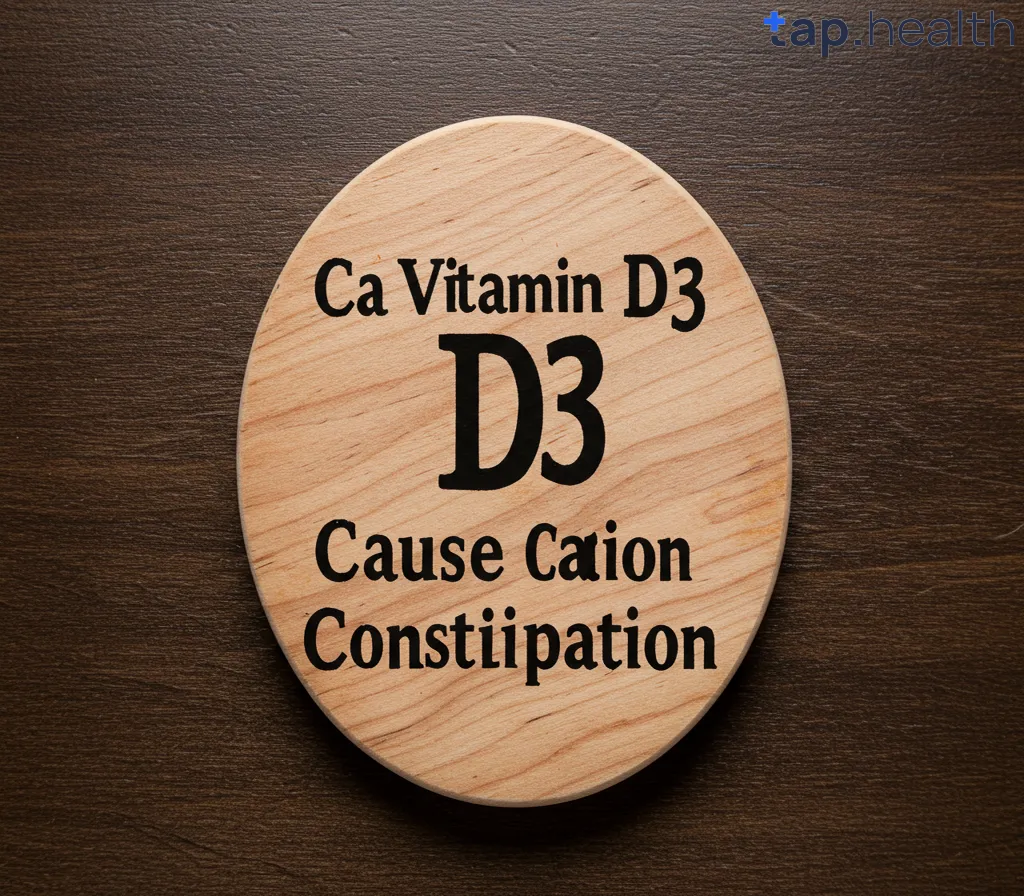Vitamin D3 is an essential nutrient that plays a key role in maintaining bone health, supporting the immune system, and regulating the absorption of calcium. Most people get vitamin D3 from sunlight exposure, certain foods, or supplements. But as with any supplement, it’s important to know its potential side effects, especially when taken in excess. One common concern is whether vitamin D3 can cause constipation.
In this comprehensive guide, we will explore the relationship between vitamin D3 and constipation. We’ll dive deep into how vitamin D3 works in the body, its connection to digestive health, and whether it might lead to constipation. By the end of this article, you’ll have a thorough understanding of the issue and how to manage it if you experience any digestive discomfort.
What Is Vitamin D3 and Why Is It Important?
Vitamin D3, also known as cholecalciferol, is a fat-soluble vitamin that helps regulate calcium and phosphorus in the body. It’s crucial for maintaining strong bones and teeth, as it helps the body absorb calcium from food. Vitamin D3 also plays a role in immune function, muscle health, and even reducing inflammation.
How Is Vitamin D3 Absorbed by the Body?
Vitamin D3 is absorbed through the skin when exposed to sunlight, but it can also be obtained through foods like fatty fish, eggs, fortified milk, and supplements. Once in the bloodstream, vitamin D3 is converted into its active form, calcitriol, which is responsible for regulating calcium and phosphorus levels.
Since vitamin D is essential for calcium absorption, an imbalance of this vitamin can affect not only bone health but also other systems, including the digestive system.
Can Vitamin D3 Cause Constipation?
Now, let’s tackle the main question: can vitamin D3 cause constipation? The simple answer is yes, but this usually happens under certain conditions. For most people, vitamin D3 supplementation at recommended doses doesn’t cause constipation. However, when vitamin D3 is taken in excessive amounts, it can lead to a condition known as hypercalcemia (high calcium levels in the blood), which may result in constipation and other digestive issues.
How Does Vitamin D3 Affect the Digestive System?
Vitamin D3 regulates the absorption of calcium in the intestines. When vitamin D3 levels are too high, calcium absorption increases, and this can lead to elevated calcium levels in the bloodstream. High calcium levels can interfere with normal bowel function, leading to constipation. Here’s how:
- Excess Calcium and Digestive Function: High calcium levels can slow down the movement of the intestines, leading to slower bowel movements. This can result in constipation.
- Dehydration: Elevated calcium levels can also cause dehydration, which may further contribute to constipation, as the body needs adequate fluid for proper bowel function.
Does Everyone Who Takes Vitamin D3 Experience Constipation?
No, not everyone who takes vitamin D3 experiences constipation. In fact, constipation is a rare side effect of vitamin D3 supplementation. Most people can take vitamin D3 without any digestive issues. However, those who take high doses of vitamin D3—often above the recommended daily intake—are more likely to experience constipation and other side effects related to excess calcium in the body.
What Are the Symptoms of Constipation Due to Vitamin D3?
If you’re taking vitamin D3 and experience constipation, you may notice several symptoms. These include:
- Infrequent bowel movements (less than three times per week)
- Straining during bowel movements
- Hard or lumpy stools
- Abdominal discomfort or bloating
- Feeling of incomplete evacuation after a bowel movement
If you experience these symptoms after starting vitamin D3 supplementation, it could be a sign that you’re taking too much vitamin D3, or that your calcium levels are becoming elevated.
How Much Vitamin D3 Is Too Much?
The recommended daily allowance (RDA) for vitamin D3 varies based on age, health conditions, and lifestyle. However, the general guidelines suggest the following:
- Infants (0-12 months): 400 IU
- Children (1-18 years): 600 IU
- Adults (19-70 years): 600 IU
- Adults (71+ years): 800 IU
- Pregnant and breastfeeding women: 600 IU
While vitamin D toxicity is rare, it’s important to note that taking very high doses of vitamin D3 (more than 4,000 IU per day) for long periods of time can lead to vitamin D toxicity, which can result in hypercalcemia and digestive issues like constipation.
How to Manage Constipation Caused by Vitamin D3
If you suspect that your constipation is due to vitamin D3, there are several steps you can take to manage the condition.
1. Reduce Your Vitamin D3 Intake
If you’re taking vitamin D3 supplements, the first step is to reduce your intake. Stick to the recommended dosage and consult with a healthcare professional to adjust your dose if necessary. Do not exceed the upper tolerable intake level, which is generally considered to be 4,000 IU per day for most adults.
2. Increase Water Intake
High calcium levels can lead to dehydration, which can exacerbate constipation. Ensure you drink plenty of water throughout the day to stay hydrated and support normal digestive function.
3. Consume More Fiber
Fiber is essential for maintaining regular bowel movements. Include fiber-rich foods such as fruits, vegetables, whole grains, and legumes in your diet. Fiber helps to soften stool and promotes regular bowel movements.
4. Exercise Regularly
Physical activity stimulates the digestive system and helps promote regular bowel movements. Even light exercise, such as walking or yoga, can help alleviate constipation.
5. Monitor Calcium Intake
Since high calcium levels contribute to constipation, it’s important to monitor your calcium intake. Avoid taking excessive calcium supplements unless directed by a healthcare provider. Be mindful of calcium-rich foods in your diet.
6. Consult a Healthcare Provider
If you continue to experience constipation or other symptoms of vitamin D3 toxicity, consult a healthcare provider. A blood test can measure your calcium levels, and your doctor can help you adjust your vitamin D3 dosage appropriately.
Can Vitamin D3 Cause Other Digestive Issues?
Constipation is not the only digestive issue that may be associated with high doses of vitamin D3. In some cases, excess vitamin D can lead to:
- Nausea and vomiting: High levels of calcium can irritate the digestive tract, causing nausea and vomiting.
- Stomach pain: Elevated calcium can also cause abdominal pain or discomfort.
- Loss of appetite: Some people may experience a reduced appetite due to high vitamin D levels.
- Diarrhea: In rare cases, very high levels of vitamin D may cause diarrhea, especially if the body tries to excrete excess calcium.
Is There Any Connection Between Vitamin D3 and Irritable Bowel Syndrome (IBS)?
There is currently no direct evidence linking vitamin D3 supplementation with the development of IBS, but vitamin D plays a role in immune function, and some studies suggest that a deficiency in vitamin D might exacerbate the symptoms of IBS. However, if you already suffer from IBS, it’s essential to be cautious when taking vitamin D3 supplements, as they might worsen digestive issues for some individuals.
FAQ on Can Vitamin D3 Cause Constipation?
1. Can vitamin D3 cause constipation?
Yes, taking too much vitamin D3 can lead to constipation, particularly if it causes elevated calcium levels in the blood. This can slow down bowel movements and make it harder to pass stools.
2. What is the recommended daily dose of vitamin D3?
The recommended daily dose of vitamin D3 for most adults is 600 IU, with a maximum upper limit of 4,000 IU per day. It’s essential not to exceed this dose without the guidance of a healthcare provider.
3. How can I prevent constipation caused by vitamin D3?
To prevent constipation, stick to the recommended daily dose of vitamin D3, drink plenty of water, eat a fiber-rich diet, and engage in regular physical activity. If symptoms persist, consult a healthcare provider.
4. What are the other symptoms of vitamin D3 toxicity?
In addition to constipation, other symptoms of vitamin D3 toxicity include nausea, vomiting, abdominal pain, and excessive thirst or urination. If you experience these symptoms, stop taking vitamin D3 and seek medical attention.
5. Can vitamin D3 supplements cause other digestive issues?
Yes, excessive vitamin D3 intake can lead to stomach pain, nausea, vomiting, and loss of appetite. It can also cause diarrhea in rare cases.
6. How can I manage constipation caused by vitamin D3?
If you experience constipation due to vitamin D3, reduce your dosage, drink plenty of water, eat more fiber, and consult a healthcare provider for advice on managing your vitamin D intake.
Conclusion
Vitamin D3 is an essential nutrient for maintaining good health, but like any supplement, it should be taken in moderation. While most people can take vitamin D3 without experiencing side effects, excessive doses can lead to high calcium levels in the body, which may cause constipation and other digestive issues. By following the recommended dosage, staying hydrated, and maintaining a balanced diet, you can minimize the risk of constipation and enjoy the health benefits of vitamin D3 safely. If you experience persistent symptoms, it’s always a good idea to consult a healthcare provider for personalized advice.



